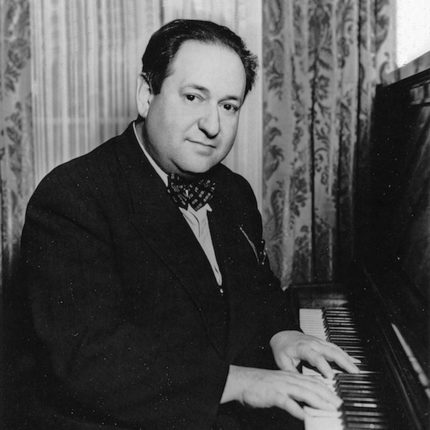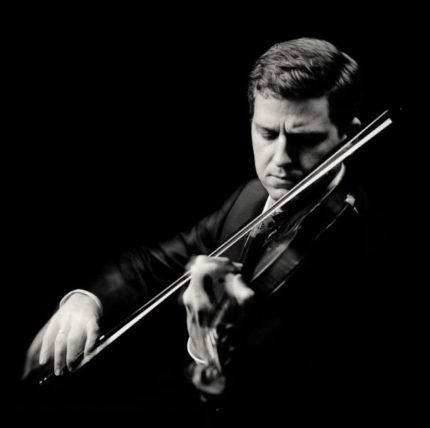Korngold Festival opens with a stylish, enjoyable program light on Korngold

For those that came of musical age in the decades following Erich Wolfgang Korngold’s death at age 60 in 1957, being a fan of his music was like belonging to a secret society.
A generation of Korngold fans were first exposed to the composer’s music as children via repeated TV viewings of Errol Flynn swashbucklers containing his lushly romantic film scores. (Locally that meant WGN’s Sunday afternoon Family Classics broadcasts with the avuncular Frazier Thomas.)
Yet one could not hear his music live anywhere. The composer’s concert music was never performed and the operas rarely staged, even in Vienna. Recordings were few and one had to hunt in the pre-internet age to locate even the handful that were available.
Sixty-five years after the death of Korngold—one of the most astoundingly gifted prodigies in musical history—the situation for his music has improved greatly. The Violin Concerto, chockablock with rich melodies, has slowly but inexorably moved from the concert-hall fringes to become almost regular repertoire. (It will be performed at this summer’s Grant Park Music Festival.) Nearly every work Korngold wrote from solo piano music, to chamber works, operas and film scores is available in multiple recordings or for free on the internet.
And yet in 2022, most of Korngold’s richly melodic and supremely crafted music has still not gotten the recognition it deserves. His operas are rarely staged in the U.S. and Chicago audiences have never heard a single one, not even his greatest success, Die tote Stadt (The Dead City). His significant oeuvre of chamber music is infrequently heard, considering its ample rewards for players and audiences alike. In four decades of concert-going, I have yet to hear Korngold’s Sinfonietta or Symphony in F sharp major performed by an orchestra.
So, kudos to the University of Chicago for giving a little extra push to this slowly unfolding revival by presenting “Korngold Rediscovered.” The ambitious ten-day festival, which opened Friday, will include symposia, a screening of The Adventures of Robin Hood, and, most importantly, several performances of Korngold’s music, including the belated U.S. premiere of Die Kathrin, the composer’s final opera.
The festivities kicked off Friday night at the Logan Center with a UChicago Presents concert by violinist James Ehnes and pianist Orion Weiss.

The program was thoughtfully conceived and performed with fine verve by both musicians. Yet the event had a not insignificant fault—it only offered two Korngold works, and of those one was a short transcription of a Korngold aria.
Granted, there is not enough Korngold music written specifically for violin and piano to fill up an entire evening. But why in the world not perform Korngold’s Violin Sonata? It may not be a masterpiece but at 38 minutes it’s the composer’s most significant work for the two instruments.
For a festival titled “Korngold Rediscovered,” exploring that neglected sonata would have served the project’s mission better than the well-known works on the program by Mozart and Schubert—let alone pieces by John Williams and James Newton Howard. What a missed opportunity.
That said, the performances by Ehnes and Weiss were unfailingly enjoyable—polished, energized and presented with informed and engaging introductions by the Canadian violinist.
Korngold’s Music Ado about Nothing Suite proved as witty and delightful as Ehnes’ verbal program notes. Collated from incidental music for a 1919 Vienna stage production of Shakespeare’s play, the instrumental version is performed much more frequently than the one for chamber orchestra.
Ehnes coaxed a delicate, echt-Viennese charm out of “The Maiden in the Royal Chamber,” and both players conveyed the humor in the inebriated march of “Dogberry and Verges.” The “Scene in the Garden” is the most characteristic section and here Ehnes and Weiss put across the arcing folk-like melody with a lean lyricism light on the Schlagobers. The concluding “Masquerade” was thrown off with an extra bit of speedy brilliance making for a bravura conclusion.
It is no exaggeration to say that Korngold was a child prodigy on a Mozart level. He composed the ballet Der Schneemann (The Snowman) at age 11, which proved hugely popular. His first two operas (Violanta and Der Ring des Polykrates) were staged and conducted by Bruno Walter while Korngold was still in his teens. Die tote Stadt, penned at 23 created an international sensation, with simultaneous premieres in Hamburg and Cologne.
So it’s apt that Korngold’s fellow prodigy be included, as was the case with Mozart’s Sonata in A major, K. 526. As Ehnes pointed out, this is really a sonata for piano as much as violin, and the performance was appropriately an equal yet deftly balanced partnership. The opening movement was wonderfully spirited and scintillating. In the Andante one wanted more light and shade at times, poised and elegant as the playing was. The keyboard writing in the closing Presto seems to anticipate the early 19th century concerto barnburners to come and Weiss’s dazzling playing was primus inter pares in this virtuosic finale.
The Fantasy in C major, written in the prolific final year of Schubert’s short life, baffled the composer’s contemporaries with its unorthodox single-movement structure and alternating sections of widely contrasted material.
Today the work can sound almost quaint. Yet Ehnes and Weiss managed to make the Fantasy’s blistering virtuosity (in the original version) and shifting contrasts seems as jarring and vertigo-inducing as Schubert no doubt intended. They also floated the long-lined lyricism winningly, which was as striking as the ratcheted up technical challenges of the variations on Schubert’s lied “Sei mir gegrusst.”
The remainder of the program offered light, encore-type pieces that broadly reflected Korngold’s personal and professional journey from Vienna to Hollywood. A worthy enough idea though, again, it would have been more on point to do so with Korngold’s own music rather than that of other composers.
Kreisler’s Caprice Viennois was thrown off by Ehnes with the delicious lilt of a Vienna cafe fiddler. “Pierrot’s Tanzlied” from Die tote Stadt received an equally light touch though here the waltz-like aria might have benefited from a touch more schmaltz.
Hollywood was represented with John Williams’ Theme from Schindler’s List, in which Ehnes’ refined violin tone offered a less heavy-handed rendition than Itzhak Perlman and was the better for it. The concert ended in a blazing pyrotechnical display with James Newton Howard’s 133…At Least, one of the more empty of the 24 encores commissioned by Hilary Hahn—who was performing downtown the same night.
A rare Hyde park standing ovation brought Ehnes and Weiss back out. Ehnes joked that since they had only played two Korngold pieces at a Korngold festival, they would attempt to aright the balance somewhat with an encore. The two men offered a rapt rendition of “Glück, das mir verblieb,” the unearthly beautiful duet from Act I of Die tote Stadt, to end the evening.
“Korngold Rediscovered” continues through April 10. Folks Operetta presents a wide survey of Korngold songs 7:30 p.m. Saturday at the Logan Center Penthouse. korngoldfestival.org
Posted in Performances


